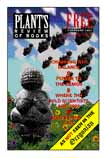

It could be a scene from a movie. High noon approaches in the frontier town of Copperfield. The twice-weekly train struggles through the white walls of the canyon, and the town's denizens await its arrival with something in between amusement and dread. A lawless, violent town, Copperfield is on the cusp of its first meeting with the Law. The only difference between this story and the movie is that the person who steps off the train into the ragged hut that is Copperfield Station is not Clint Eastwood or Jimmy Stewart but, as Stewart Holbrook put it in his story "The Affair at Copperfield,":
The ugly blot on the map of Oregon that was Copperfield no longer exists. It was removed by Miss Fern Hobbs, who was twenty-five years old and weighed exactly 104 pounds when fully dressed and wearing her gold pince-nez.
Fern Hobbs, one of Oregon's first woman lawyers and private secretary to Governor Oswald West in the middle of the second decade of this century, is (by stretching the term slightly) but one of the "forgotten men" of Holbrook's Lowbrow Northwest. It is a slightly different Northwest than most of us are used to, one in which all that matters are not the doings of the great merchant families, not simply the pioneers and the settlers pioneering an settling. It is a human history that reminds us that there is more to life (and death) than moving from place to place, buying and selling, stolidly living from day to day.
Holbrook himself is a victim of time, as Brian Booth, the editor of this collection explains to us in the introduction. A best-selling author from the late Thirties until his death in 1964, Holbrook became acquainted with the Northwest as a laborer in logging camps along British Columbia's Fraser River. He spent several years in the woods, reading, writing, and logging on the side. His experiences in the big timber, and his connection with a side of life that, while prevalent throughout the Northwest, was nonetheless little recorded by most chroniclers, led to a lifetime of writing about the parts of our heritage that we too easily forget. Yet, as with many popular literary tastes, fame was transitory, and Holbrook, whose regular acquaintances included Bennett Cerf and New Yorker editor Harold Ross, has faded through the years into the fog of recent Oregon history.
Brian Booth has gone intrepid into those mists (see his interview immediately following), and brought back twenty-six of Holbrook's blazes from the trail of our Northwest heritage. With vignettes on scattered hamlets of our region like "The Affair at Copperfield," "Anarchists at Home," and "The Gorse of Bandon;" tales of dastardly deeds such as "Death and Times of a Prophet" and "The Great Homestead Murders;" and samplings of people and places long gone ("Erickson's: Elbow Bending for Giants," "Daylight in the Swamp," "The Last of the Wobblies"), Wildmen, Wobblies & Whistle Punks provides the detail of a contour map laid over the well-worn ruts of the Oregon Trail.
The history that Holbrook put forth was not always pretty. Indeed, he took (in the words of Lucius Beebe) "intense pleasure in the delusion that Portland...was a sink of vice and licentiousness." Holbrook's loggers were a breed apart from mankind: the roughest, toughest, rip-snortinest beings that ever did rise from the ground. His villains performed the most villainous deeds. His heroines were the most heroic. His Wobblies were the Wobbliest. What Holbrook excelled at, however, was in showing that even the most exceptional cases he chronicled were the most normal; that it was, underneath the red flannel shirt of the woodsman, the finery of Miss Fern Hobbs, and the grimy nakedness of prophet Joshua the Second, the beating heart of an ordinary human.
Therein lies the appeal of Holbrook to readers past and present. There exists a chasm between the heroines and heroes of yesteryear--the enterprisers and plucky souls who came West in the great migrations of the nineteenth century--and the inhabitants of the metropolises and towns of the present day Northwest. What did they do once they got here? Surely no one believes they simply took root until our grandparents and parents came on the scene? (Those of you from outside the region can simply ignore the previous two lines--nobody expects you to know.) Holbrook reveals, well, not all, but a lot. The stories here span roughly a century: from the 1850s to the Second World War, but the bulk of them are set in the first half of this century, covering an era (and subjects) that have not yet been cleanly sanitized into history books. With hope, Brian Booth's resurrection of Holbrook's work will stand as a warning to those upon whose shoulders that task will fall that it will be no easy matter.
Too, no simple task to rebuild the stature that Holbrook once enjoyed in Portland and beyond. Here is one of our region's greatest storytellers, a writer whose works, with plain and simple prose, set forth a wide assortment of our forgotten history for our delectation, forgotten now but for this volume.




 Return to Facing
Return to Facing